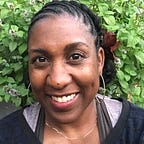Jamiah Hargins & Crop Swap LA
Black History Month, day 23
Everybody eats. Regardless of politics, skin color, religion, or how much money we have in the bank, we all need food to live. And we all need healthy food to be healthy.But not all of us have the same access to nutritious food. Not by a long shot. These areas are commonly referred to as “food deserts” and tend to be predominantly areas of low income, areas where residents often don’t have cars, and they are almost always communities of color. It’s a sad reality that health outcomes are worse for people of lower-income. And on account of a legacy of racism, people of color are more likely to fall into low-income groups.
In a community in which we don’t have agriculture readily available, there are individuals connecting, branching, bargaining, and creating a community using crops as the means of connection. — Jamiah Hargins
To address these issues, grassroots groups are helping people without land access join a yard-sharing program to grow food for their communities. Some of these are led by pioneering Black gardeners who know what it’s like to live in densely populated urban areas with little access to fresh food.
For example, Jamiah Hargins, a 36-year-old part-time talent strategist at the National Immigration Law Center, started growing food at home because he wanted more nutritious options for his family. He soon found that he grew more than they could eat, so he turned to social media to start a “crop swap” with neighbors who were dealing with a similar excess. Launched in 2018, Crop Swap LA has since moved towards a more expansive yard-sharing model. For space-strapped areas, yard sharing offers an appealing partnership between those who want to grow their own food but lack the skills to do it and those who have the technical know-how but no space of their own to apply it.
How cool and generous is that? This is community building for resiliency, self-sufficiency, health and well-being, everything that the Napa County Seed Library is about. (Adapted from: Food Revolution Network, Colleen Hagerty for The Counter)
